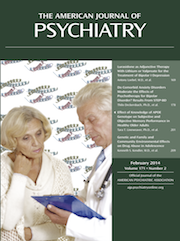T
o the E
ditor: Professor Burns’ claim that three randomized trials have now failed to find any benefit for involuntary outpatient commitment in reducing hospitalizations is debatable. The first trial (
1), conducted in North Carolina in the 1990s, found that patients randomly assigned to outpatient commitment had a significantly reduced monthly risk of hospitalization (odds ratio=0.64, 95% confidence interval [CI]=0.46–0.88, p<0.01). Moreover, hospitalization was not the only outcome that mattered in the North Carolina study; the outpatient commitment group was also significantly less likely than the comparison group to experience criminal victimization over the 12-month follow-up (
2) (23.5% and 42.4%, respectively; p<0.01).
The second trial, an evaluation of New York State’s pilot program for assisted outpatient treatment based at Bellevue Hospital (
3), reported null findings but was hampered by implementation challenges and methodological limitations that may have biased its results. The Bellevue study’s protocol problems ranged from an imbalance in randomization (significantly more substance abusers were assigned to the experimental group) to an unclear distinction between court-ordered treatment and voluntary participation in the assisted outpatient treatment program (participants often did not know which arm of the study they were in) to inadequate statistical power.
The third trial, the Oxford Community Treatment Evaluation Trial (OCTET), was recently completed in the United Kingdom by Professor Burns and colleagues (
4). The OCTET study compared community treatment orders to a form of conditional release (Section 17 Leave), described by the authors as “two forms of mandatory outpatient care.” While the control group participants experienced fewer days under compulsory treatment with no worse outcome, the OCTET study’s design did not permit a comparison to truly voluntary care. As a result, we do not believe that these three randomized trials are fully comparable, nor do they definitively address questions about the effectiveness of such mandated treatment programs.
Professor Burns’ claim that our recent cost study confounded the effects of legal compulsion and intensive treatment neglects a key finding. In the primary report of our evaluation of assisted outpatient treatment in New York—the parent study for the cost analysis—we compared hospitalization outcomes for participants on assertive community treatment teams with and without a court order. We found that the court order did confer an advantage over and above assertive community treatment (
5). While not a randomized trial, the assisted outpatient treatment evaluation study used rigorous quasi-experimental methods, including propensity score matching and adjusted multivariable time-series analysis. This study also rigorously evaluated the outcomes of thousands of patients in real-world conditions under assisted outpatient treatment—far more than could be feasibly evaluated in a randomized trial.
Public mental health care systems continue to face the challenge of how best to meet the needs of adults with serious mental illnesses, a substantial proportion of whom have difficulty in adhering to prescribed treatment in the community and as a result experience repeated involuntary hospitalizations or contact with the criminal justice system. Mandatory outpatient treatment—when appropriately targeted and accompanied by intensive community-based services—can be a less-restrictive substitute for hospitalization of people otherwise at risk of poor mental health and safety outcomes. Policymakers and mental health stakeholders should carefully weigh the contested evidence for outpatient commitment against these alternatives.

